Top 10 Presidential Candidates Who Should Have Won
Every four years the good citizens of this country drag themselves to the voting booth (well, actually about half of them do, the rest being far too busy to concern themselves with such things as picking the leader of their nation) to pick the candidate they hope will do the least amount of damage to the country over the next 48 months. Usually they are reasonably successful at picking, if not the best man possible, at least the best one available, but every once in a while they find themselves wishing they’d pulled the other lever. Below is my list of those men who, in the hindsight of history, would probably have made a better president than the victor did. Some of these men were sitting presidents who were unseated by a lesser opponent, but most were first time candidates who offered a real alternative but were overlooked for whatever reason.I’m aware that a list like this is highly subjective and I realize that some of my picks will be controversial—causing great anguish and threats of retribution—but such is the price for doing things like making top ten lists. Undoubtedly, you will be able to point out all sorts of people that should be on this list but are not—or, conversely, why some who are on it should not be—which is to be expected. And, finally, none of my picks should be construed as an indictment of any candidate’s personal character; I’m not trying to trash people here, but merely give the reader a look at what might have been but for the fickleness of fate and the electorate.
10. GERALD FORD over JIMMY CARTER, 1976
It’s not that Gerald Ford was the greatest president the country had ever seen or that Carter lacked the intelligence and experience to be president, it’s just that Carter was ill-suited to make the really tough decisions the job demanded, while Gerald Ford had already proven that he was capable of making those decisions. How that would have impacted the Iran hostage crises and the economic downturn of the late seventies could only be guessed at, but in retrospect, Jerry Ford couldn’t possibly have done any less inspiring a job than the peanut farmer from Plains, Georgia did. Either way, Ronald Reagan would have ended up the next president.
9. HENRY CLAY over JAMES K. POLK, 1844
It’s not that Polk wasn’t a capable man, it’s just that Henry Clay was a man with a remarkable résumé. A congressman and senator from Kentucky with over forty years of legislative and executive experience (including a previous run for the presidency in 1832), Clay had served as Speaker of the House and Secretary of State before running against Polk (and losing in a squeaker). An abolitionists who did his best to limit the spread of slavery and a colleague of Daniel Webster and John C. Calhoun (plus a man greatly admired by Abraham Lincoln), in 1957, a Senate committee chaired by John F. Kennedy named Clay as one of the five greatest senators in U.S. history. Polk, in comparison, while no slacker, had less experience and could have used a bit more polishing—even though he did okay.
8. GEORGE BUSH over BILL CLINTON, 1992
Okay, I know Bill Clinton oversaw one of the great economic boom times in recent history (thanks largely to acquiescing to the GOP controlled congress) but I submit that old George got shafted out of a well-deserved second term. After all, here was a man with a résumé as thick as a phone book who had overseen the largely peaceful collapse of Communism in Europe and successfully prosecuted two wars in two years (Panama and the Persian Gulf), only to lose to a draft evader and two-term Arkansas governor because of a minor recession that occurred late in his term, the incoherent promises of third party candidate Ross Perot, and the oratorical skills of slick Willy. Hardly seemed fair but whatcha gonna do?
7. RICHARD NIXON over JOHN F. KENNEDY, 1960
This is easily my most controversial pick, especially in light of the Kennedy mystique that developed in the aftermath of the man’s assassination. I don’t make this selection, however, because I believe Kennedy was a bad president. My position is that in light of the Cold War tensions that were going on in 1960 and the situation in Cuba, Richard Nixon was probably in a better position to confront the Soviets and resolve the Cuban situation than the neophyte Massachusetts senator was, as Kennedy proved by approving the Bay of Pigs invasion in April of 1961 and then failing to back it once it began. Nixon, in contrast, was in on the planning for the Cuban invasion from the beginning and would undoubtedly have given the Cuban nationalists the air support they needed to oust Castro, thus removing a fifty year long thorn in our side and foregoing the ensuing Cuban missile crises of October, 1962. How Nixon would have dealt with Vietnam in its infancy, civil rights, and the space program remains a great unknown of course, but it definitely would have been an interesting time that might well have transformed the sixties into something more closely resembling…well, the fifties.
6. HORACE GREELEY over ULYSSES S. GRANT, 1872
While the Civil War General was still wildly popular and Grant was a man of personal integrity, his first four scandal-ridden years in the White House demonstrated that he was in way over his head as president. None-the-less, the Democrats couldn’t seem to find anyone who thought they could unseat him, so they nominated none other than newspaper man and writer Horace Greeley as token opposition. However, Greeley was no slacker, but a genuine reformer and intellectual who probably would have shaken things up. Whether for better or worse is anyone’s guess, but it would have been interesting to see what he would have done had he been given the chance. Unfortunately, he died just a few weeks after losing the election to Grant, but it could be argued that even a dead Horace Greeley would probably have been an improvement over a live U.S. Grant.
5. HORATIO SEYMOUR over ULYSSES S. GRANT, 1868
There’s no denying that Grant was a superb military commander. The problem is that superb military commanders often do not make for good presidents, as Grant’s corruption-plagued and largely inept eight years in the White House later proved. Seymour, on the other hand, had oodles of political experience, including two tumultuous stints as Governor of New York. Even better, he never sought the nomination for president and was essentially drafted by his party to run, demonstrating that unlike most men who seek the presidency, ambition was not one of his short-comings. Would he have been a great president? Probably not, but considering how poor Grant fared, he couldn’t help but to have been better.
4. SAMUEL TILDEN over RUTHERFORD B. HAYES, 1876
Actually, Tilden won this election but lost the electoral college vote count through some partisan shenanigans, but that’s another story. In any case, this was the man who took on the corrupt Boss Tweed and his Tammany Hall boys in New York and won. A genuine reformer, it is likely that he would have done considerably better than the scandal ridden Hayes had the will of the people been upheld. Unfortunately, like Greeley four years earlier, he also went into failing health after the election, so we don’t even know if he would have lived long enough to do much had he persevered, though all the tea leaves read positive.
3. JAMES COX over WARREN G. HARDING, 1920
After the eight years of turmoil created by the Wilson administration, the country was ready for a “return to normalcy” and in doing so sent one of the most corrupt and incompetent men ever to be president to Washington while repudiating the one man who really might have done some great things had he been elected. Clearly, the former newspaper reporter, Ohioan congressman and two term governor would have been a huge improvement over the womanizing and inept Harding, and he had a pretty decent vice-president named Franklin Delano Roosevelt to boot. (Side note: Imagine that had Cox won and if FDR had succeeded him in 1928, only to get hammered by the Stock Market Crash in 1929 and the resultant depression, whether he would have lost in a landslide to Herbert Hoover in 1932? Weird to think about, huh?)
2. WINFIELD SCOTT over FRANKLIN PIERCE, 1852
This is kind of a tough call for neither man was especially qualified to be president, but Pierce proved to be such a bad one—despite being, by most accounts, a fairly nice guy in general—that it probably would have been reasonable to have let ol’ Winfield take a shot at it. At least Scott wasn’t pro-slavery and a secessionist (Pierce being one of the few ex-presidents to support the confederacy), nor was he as likely to have made the catastrophic decisions—such as repealing the Missouri Compromise and reopening the question of the expansion of slavery in the West that made succession growingly unavoidable—that poor Franklin did. Winfield was no saint himself (he was in charge of removing the Cherokees from their homes in the southeast United States, though he was acting under orders from then President Andrew Jackson) but he was an able general, having successfully led the U.S. Army against Santa Ana in Mexico, and a man with some impressive leadership skills. Would he have been able to prevent the Civil War from occurring had he been president? Hard to tell but he doubtlessly would have at least made some effort to do so, which is more than can be said for Pierce.
1. THEODORE ROOSEVELT over WOODROW WILSON, 1912
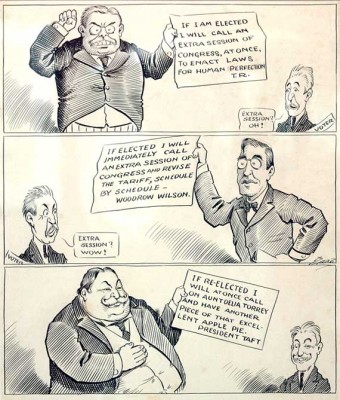
Charles Lewis Bartholomew, ca. 1912. Untitled. This election marked the only time that graduates of Harvard (Teddy Roosevelt, top), Princeton (Woodrow Wilson 1879), and Yale (President William Howard Taft) competed in a presidential election campaign. Courtesy Princeton University Archives
It would have been interesting to see how the twentieth century would have turned out had the hawkish TR been given his parties’ nomination and won a third non-consecutive term as president in 1912. It’s hard to imagine him standing idly by for two years while war raged in Europe as Wilson did without throwing America’s weight in against the Kaiser, probably ending the conflict a couple of years early and saving the world from having to fight Germany again twenty years later. Whether he would have come up something like Wilson’s League of Nations remains to be seen (Teddy more likely would have pursued an isolationist policy) but regardless, it would have made for quite a different century, one would think.
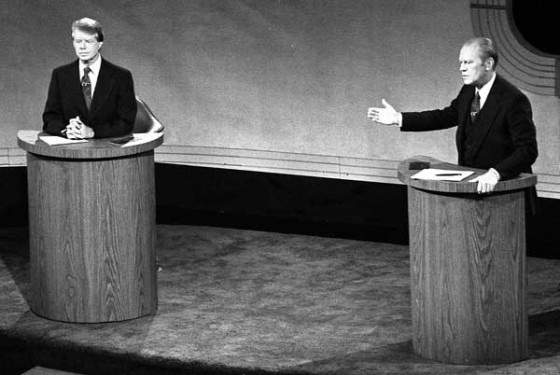
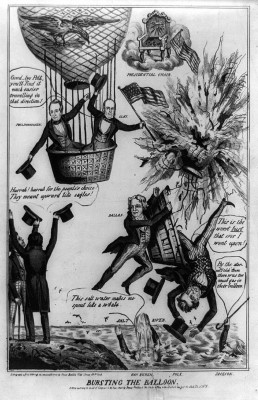
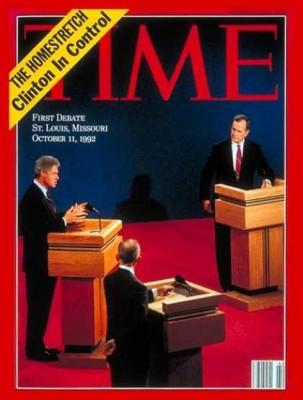
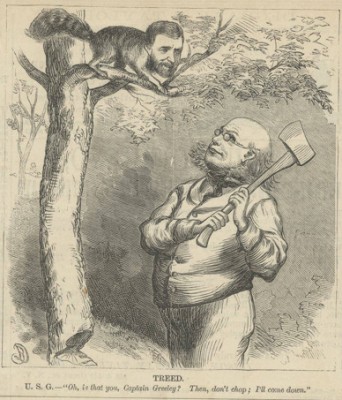
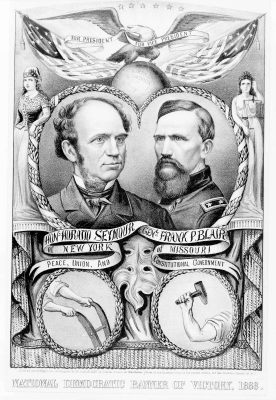
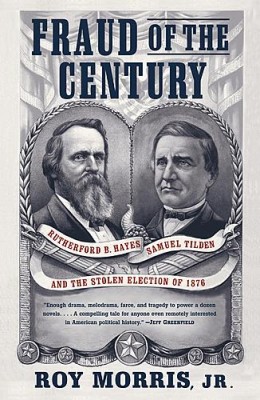
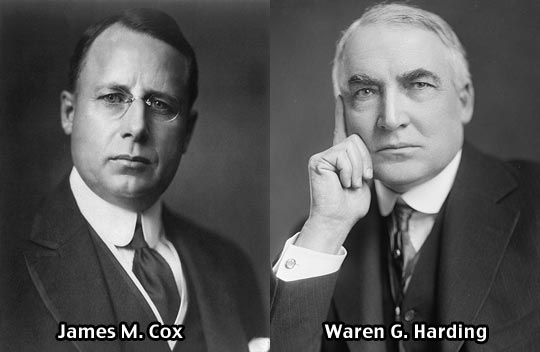
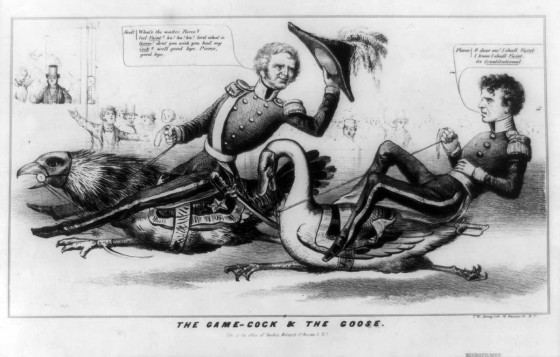
No comments:
Post a Comment